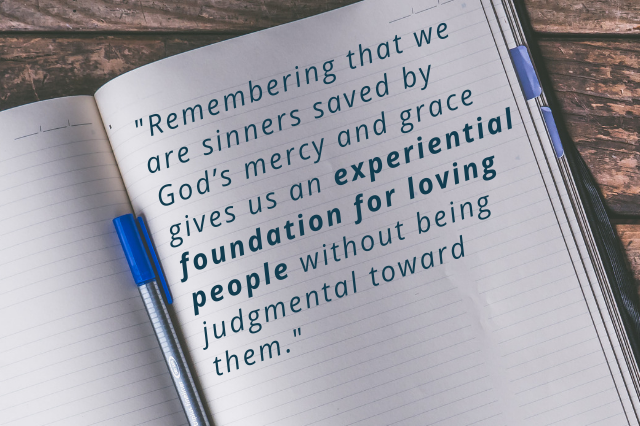
Last month I hope you were encouraged by my blog article about loving with discernment. Christians must be loving and discerning in a culture that can’t tell darkness from light, that insists that love requires tolerance of what the Bible clearly states is sinful, and that pressures the church to embrace—no, even more—to support and celebrate those sinful lifestyles. However, if we aren’t careful, in our efforts to be discerning, we can easily fall into the judgment ditch. I hope to prevent you from stumbling into that pit regarding people who, just like yourself, have either sinned in ignorance or been misguided by well-meaning counselors, and who still bear the consequences of sins they committed before they met Jesus.
We are all sinners
The apostle Paul often reminded his readers of their sinful conditions before grace came to them. For instance, to the Colossians he wrote, “And although you were formerly alienated and hostile in mind, engaged in evil deeds…” (Colossians 1:21). He reminded the Ephesians, “And you were dead in your trespasses and sins, in which you formerly walked according to the course of this world, according to the prince of the power of the air, of the spirit that is now working in the sons of disobedience. Among them we too all formerly lived in the lusts of our flesh, indulging the desires of the flesh and of the mind, and were by nature children of wrath, even as the rest” (Ephesians 2:1-3).
If we are going to live to love with Jesus, then yes, we need discernment; but we also need to remember that we too are sinners. It’s crucial that we live in the awareness of and gratitude for the forgiveness, cleansing, mercy, and grace that we have received. After warning the Corinthians of God’s judgment that is coming to those who continue to practice sin, Paul reminded them, “And such were some of you” (1 Corinthians 6:11). Remembering that we are sinners saved by God’s mercy (we haven’t received what we deserve—God’s judgment and wrath) and His grace (we have received what we don’t deserve—God’s forgiveness, presence, and grace to live righteously) gives us an experiential foundation for loving people without being judgmental toward them. Not judging them goes deeper than simply not communicating in our words or facial expressions an underlying disapproving attitude. It means living close to Jesus so that we share His compassion toward those who are “sitting in darkness” (Matthew 4:16), and then following His leading to show them the genuine love and light of God.
We are to hate and expose sin, and that’s not being judgmental
Perhaps you’ve heard that as Christians, we are to hate the sin, but love the sinner. Well said. The following Scriptures clearly support this distinction between sin and the sinner.
1 Corinthians 6:2b-3 If the world is judged by you, are you not competent to constitute the smallest law courts? Do you not know that we will judge angels? How much more matters of this life? [Christians are to judge what is sinful by the Word of God, which means to expose and judge sinful words and actions. Please notice that Paul said matters, not people. The ways that we look at and speak to or about other “sinners” will convey either the genuine love of God or something else that is not His love. Being aware of our propensity to elevate our own spiritual life above the condition or place that others are in can keep us in a humble position so we can truly love them.]
Galatians 6:1 Brethren, even if anyone is caught in any trespass, you who are spiritual, restore such a one in a spirit of gentleness; each one looking to yourself, so that you too will not be tempted. [When someone sins, we’re called to hate the sin enough to call it what it is, and to love the sinner by gently restoring them to a righteous walk].
Ephesians 5:11 Do not participate in the unfruitful deeds of darkness, but instead even expose them; [Expose sins according to what the Scriptures say about them, and don’t participate in those deeds, but encourage one another to be filled with the Spirit (v. 18)].
We are to love without being judgmental
Do you agree that your church is filled with people who still are suffering consequences of past sins? Probably you’re one of them! The consequences of some sins may seem almost insignificant, and surely that’s due to God’s mercy. Yet when our suffering is small or short-lived, we may wrongly conclude that our sins were not that important or substantial. In contrast, other sins have longer-lasting consequences, and these also show us God’s mercy. Let me explain what I mean.
If you are one of those who fit into the first category, with sins that seem relatively insignificant, you shouldn’t allow yourself to think that you are better than anyone in the second category, whose sins must have been “great” because their impact is ongoing. That kind of thinking does not come from the love of God, but is judgmental and self-righteous. We shouldn’t need to have that pointed out, yet I’d bet that most of us, at least sometimes, must confront the smug spirit that wants to convince us of our superiority over “that guy” who did something “really bad,” don’t we? If the sins in your life seem minor to you, then you need to remind yourself that the only reason sin’s consequences aren’t still in your face and evident to everyone is because God has been merciful to not give you over to sins that bear longer-lasting consequences.
It’s very important to realize that this mercy toward you doesn’t mean that you’ve been righteous or that you were incapable of terrible evil. Asking God to help you believe the old adage, “There but for the grace of God go I” is a powerful means of becoming truly humble-minded. In this place you can thank God each day that He has been so merciful to you and that He keeps you every day by His grace. If you’ve never experienced “gross sin,” then you may suffer from self-exaltation and spiritual pride, which in God’s eyes are pretty “gross.” In any case, you need His righteousness as much today as you did every day before He first came to you. His judgment was that you were a sinner, and to whatever degree He gave you over to your sin, the difference between His righteousness and your sin should humble you before Him as much as it does for “the worst of sinners.”
For those of you who still have your sin ever before you because of longer-lasting consequences, you too have received God’s mercy. Was it not the consequences of your sin that led you to see that you needed Jesus and were incapable of living life on your own? Don’t the continuing consequences of your sins provide opportunities for you to humble yourself before His throne in gratitude for His continued mercy and grace? Aren’t you glad God has judged your sins in Christ at the cross and set you free from its penalty so you can live to love Him and others without condemnation and shame?
Your consequences aren’t meant to be a stigma or a badge of shame within the body of Christ. “But you were washed, but you were sanctified, but you were justified in the name of the Lord Jesus Christ and in the Spirit of our God” (1 Corinthians 6:11). Instead, they are opportunities for the love of Christ to flow and make His body whole. Your entire life has become a blessing to the Church by highlighting the extent of God’s mercy, grace, and love! Whatever you did was not so great that the blood of Jesus would not wash away your guilt. We praise God for that! We also rejoice that in whatever ways you still suffer, they are not so great that the power and love of God will not carry you. You are a picture of hope and assurance to those who are still walking in darkness and to fellow believers who struggle to believe that God loves them. Your life has been ordained by God, and His purpose for you is just as exalted as the purpose He has for the brother or sister who is challenged by fleshly pride that arises from their thinking that they have never sinned greatly!
My point is this: God has already judged all sins in everyone who is a part of the body of His Son, Jesus Christ. In Christ, at the cross, God loved us by judging and justifying us. No further judgment is needed! If we judge our brother or sister for their sins, which they have confessed and of which they have repented, we imply that God’s work in Christ at the cross and in His resurrection was insufficient to make His body whole. That attitude may be a greater sin, if one continues in it, than the past sin of the brother or sister whom we are judging! Without realizing it, we may proudly be setting ourselves up as the accuser, prosecutor, judge, and executioner of a fellow heir of God’s grace. This mindset is more like Satan than Jesus Christ. That’s a weighty thought!
Live to love with Jesus without judgment
When we live to love with Jesus, we expect God to put all kinds of people in our paths, all of whom are sinners. Some have yet to be saved, and some have already been saved, but all will in some way be experiencing the consequences of their sins. When we love like Christ, we will be determined to do what we can to help those in our paths to experience God’s highest good for them, to know Him, and to love with Him.
If God has chosen to forgive and be with a brother who still carries the baggage of his past life before he knew Christ, then shouldn’t we love that brother like Jesus loves him? These co-heirs of God’s grace and promises don’t need more guilt and shame heaped upon them by the judgment of fellow believers. If they are redeemed, then they know their sin and are aware of the guilt and shame it has produced. What they need is to be loved and accepted in Christ as they are. There may be times when we need to lovingly confront someone about what they are doing. However, our aim should always be to do that with the heart of Christ, in a non-judgmental way—to “speak the truth in love.” Our main role is to support and help them “come to know and to believe the love that God has for them” (1 John 4:16). They need our continual encouragements that they too can live to love with Jesus. We can show them by our example how to do this by not judging them while they are still immature and the consequences of their past lives endure. And as we love them without judgment, they will also learn how to do the same with those whom God puts in their paths.
If we, humbled by our past and present sins, live to love with Jesus, the body of Christ will grow to maturity. I hope this month you’ll ask Jesus how you can live to love with Him without judgment toward others in the body of Christ. May His love flow freely through you as you trust in God’s judgment, justification, and sanctification of those He puts in your path to love, for His glory.
- Log in to post comments
